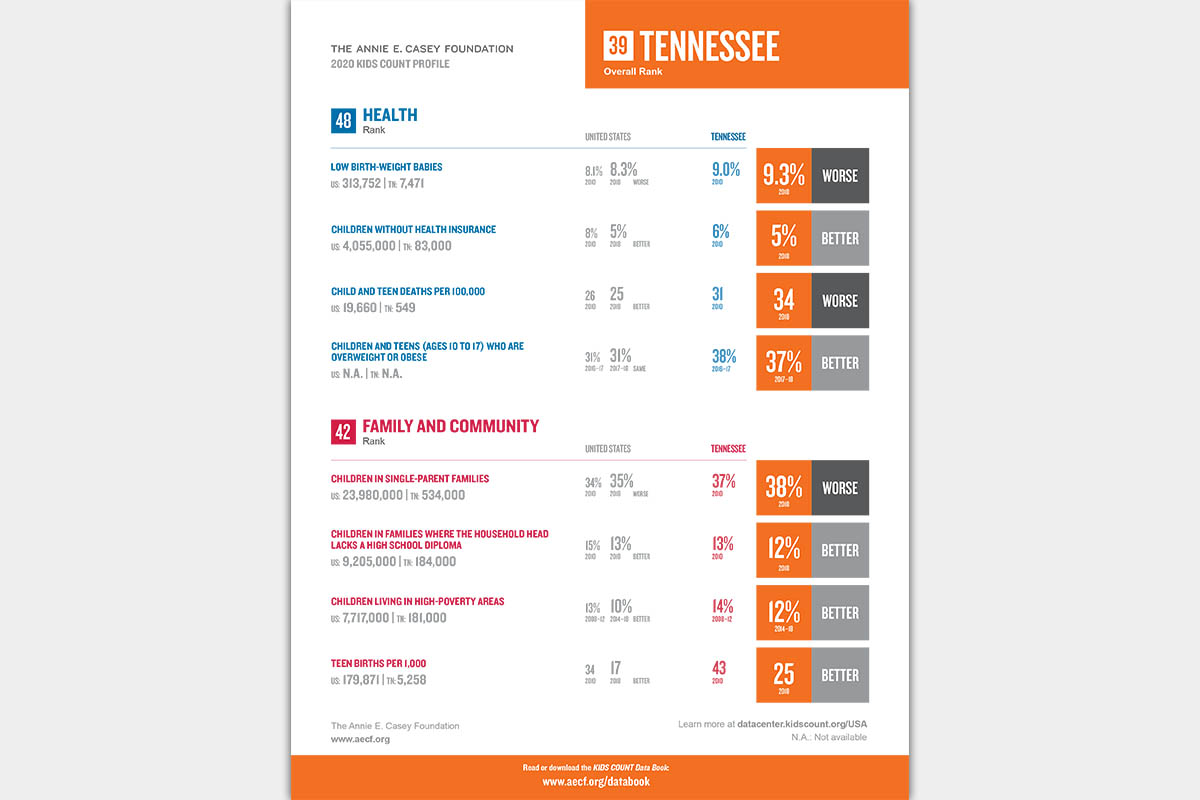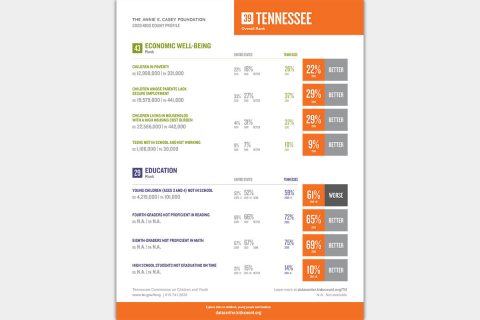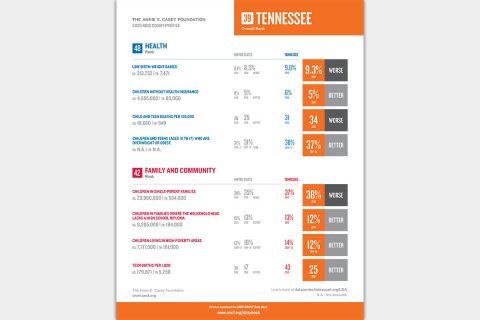 Nashville, TN – The well-being of Tennessee children has improved in many areas in the last 8 years, according to information in the KIDS COUNT® Data Book released today by the Annie E. Casey Foundation. Despite having been ranked in the 40s in earlier years, the state’s overall rankings in recent years have stayed in the 30s, including its ranking of 39th in the 2020 report.
Nashville, TN – The well-being of Tennessee children has improved in many areas in the last 8 years, according to information in the KIDS COUNT® Data Book released today by the Annie E. Casey Foundation. Despite having been ranked in the 40s in earlier years, the state’s overall rankings in recent years have stayed in the 30s, including its ranking of 39th in the 2020 report.
“While changes in the way the data are collected limit our ability to compare this year’s ranking to older ones, TCCY is pleased Tennessee now ranks better than it did in the early days of its participation in KIDS COUNT when the state ranking was much nearer the bottom,” said Richard Kennedy, Executive Director of the Tennessee Commission on Children and Youth, the state’s KIDS COUNT affiliate.
Tennessee’s strongest gains came in 4th-grade reading proficiency and 8th-grade math proficiency, determined by scores on the biannual National Assessment of Educational Progress (NAEP).
“Tennessee’s school children are making gains,” said Kennedy. “Continued investments in education, especially to address the racial and ethnic disparities that remain, are key to the state’s future prosperity.”
Though the data in the report documents the state of children and families before the pandemic, the report recognizes that 2020 will be remembered as a year of crisis. It recommends that states concentrate their efforts on helping children, families and communities become more resilient so they can continue to thrive.
The report also shines a light on the ongoing racial and ethnic disparities in the data. While children of all races and ethnicities have seen improvements over the last several years, disparities are persistent and systemic.
Tennessee’s 2020 ranking on how the state is providing opportunities and supports to children and families is based on rankings in four domains ? economic well-being, education, health and family and community context, each of which is comprised of four measures. Data from 2018, the most recent year available, is compared to data from 2010 to look at trends over time.
Tennessee’s highest rank is in the education domain at 29, and its lowest is for health, where the state ranked 48.
The state’s education domain rank is supported by the 90 percent of Tennessee high school students graduating on time in 2018, the third-highest rate in the country, and by relatively high achievement in 4th-grade reading and 8th-grade math. However, the state had one of the lowest rates of young children attending pre-K programs, with over 60 percent not enrolled in early childhood education.
Tennessee struggles with health issues and fell in the rankings to 48th from 33rd last year. Low birth weight continues to be a challenge, with 9.3 percent of babies born at low birth weight, higher than the national average of 8.3 percent, and one of the 10 highest rates in the country. The state’s ranking was also negatively affected by a change in indicators that make up the health ranking.
A previous measure of teen substance use was problematic and was switched out for a measure of youth overweight and obesity. Tennessee had always ranked well on the substance use measure, but the state is 48th on the overweight and obesity measure. This change has lowered Tennessee’s overall health rank.
The state dropped a bit across all measures in the economic well-being domain compared to last year, moving to 43rd from 32nd. Family economic challenges continue to be a problem for the state, with more one in five children living in poverty. However, Tennessee has seen improvement in all the economic well-being measures compared to 2010.
The state has also lost a little ground in family and community context, falling to 42nd from 39th last year. Tennessee’s teen birth rate dropped from 43 per 1,000 in 2010 to 25 per 1,000 in 2018; however, rates in other states decreased at a faster rate, leaving Tennessee ranked 41.
“Tennessee has been a leader in good public policy. With multiple challenges facing children and families during the COVID-19 pandemic, this is a moment for Tennessee to increase investments to support families rather than reduce them,” said Kennedy.
Release Information
The 2020 KIDS COUNT® Data Book will be available online June 22nd at 1:01pm CT at www.aecf.org
Additional information is available at www.aecf.org/databook. Journalists interested in creating maps, graphs and rankings in stories about the Data Book can use the KIDS COUNT® Data Center at datacenter.kidscount.org.
About the Tennessee Commission on Children and Youth
The Tennessee Commission on Children and Youth is an independent agency created by the Tennessee General Assembly. Its primary mission is to advocate for improvements in the quality of life for Tennessee children and families. Information on the agency is available at www.tn.gov/tccy.
About the Annie E. Casey Foundation
The Annie E. Casey Foundation creates a brighter future for the nation’s children by developing solutions to strengthen families, build paths to economic opportunity and transform struggling communities into safer and healthier places to live, work and grow. For more information, visit www.aecf.org. KIDS COUNT® is a registered trademark of the Annie E. Casey Foundation.





